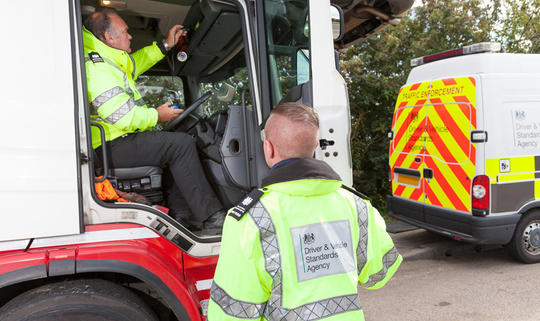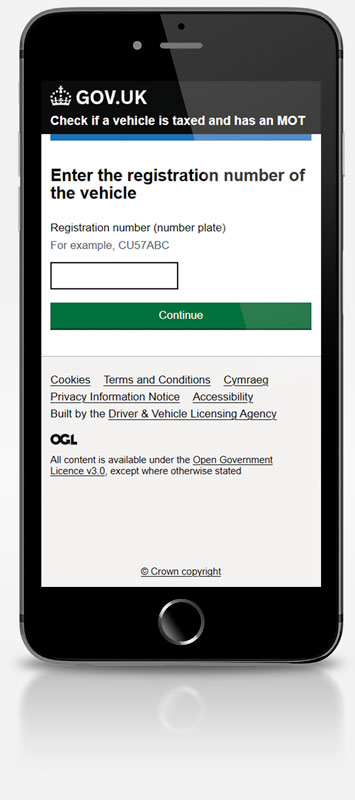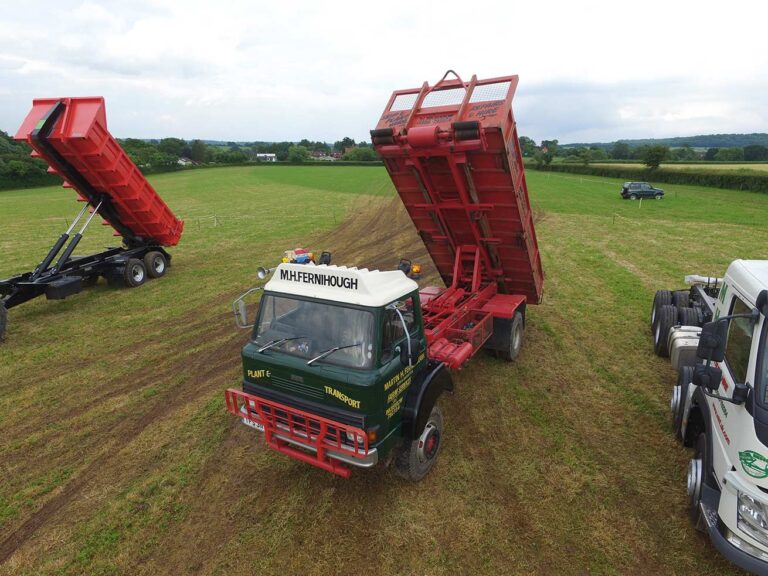An HGV MOT is an essential part of heavy goods vehicle maintenance that ensures you’re complying with the UK’s standards of roadworthiness. An HGV MOT check is your first step in this, providing you with the digital records of HGV MOT pass or failure of a particular heavy goods vehicle.
It is important to know the class of HGV that requires an MOT. You can check the class of your vehicle/s here or at GOV.UK
Commercial vehicles such as HGVs, trailers and buses must have an annual MOT check if they fall in to any of the following categories:
Form V112/G provides a comprehensive list of the vehicles that are exempt from the HGV MOT. Please note that some vehicles may still require a standard MOT.

Anyone can check the MOT status of a vehicle by visiting the DVLA website and using the vehicle enquiry service. This lets you find out if a vehicle has an MOT certificate and when it runs out. All you need is the registration number of the vehicle, which can be found on the number plate.

The cost of vehicle and trailer tests and certificates carried out at authorised testing facilities can be found on the GOV.UK website. These are private facilities although the tests are carried out by Driver and Vehicle Standards Agency (DVSA) assessors.
The cost and duration of trailer MOT checks varies according to the number of axles.
| Vehicle Type | Cost | Duration |
|---|---|---|
| 2 axle HGV | £91 | 40 minutes |
| 3 axle HGV | £113 | 45 minutes |
| 4+ axle HGV | £137 | 55 minutes |
| 1 axle trailer | £41 | 21 minutes |
| 2 axle trailer | £54 | 25 minutes |
| 3 axle trailer | £64 | 30 minutes |
| 4 axle trailer | £64 | 35 minutes |
| 5 axle trailer | £64 | 40 minutes |
In addition to the cost of the MOT, each vehicle must also pay a lane fee, which unlike MOTs is subject to VAT. The cost of the lane fee varies from site to site but is roughly £50 for a rigid vehicle and £38 for trailers.
Full details, including cost and duration of re-tests and part-paid re-tests can be found here.

Vehicles may be awarded an MOT exemption certificate if they are powered by electricity and were registered before 2015. However, these vehicles must undergo an annual roadworthiness test if they are to be used for commercial purposes.
Vehicles which weigh over 3,500kg (or which fall in to type approval categories N2, N3, 03, 04 or T) are exempt from goods vehicle testing.
In total there are 36 categories of vehicle that are exempt from MOT testing, and these can be found on form V112G. For any clarification or queries about HGV MOT exemptions you should contact the DVSA.
HGV and trailer MOT checks cover the overall condition of a vehicle or trailer and will make sure that it meets minimum safety standards and that fittings such as tyres and brakes are suitable for the class of HGV or trailer.
A qualified inspector will inspect the vehicle or trailer’s essential components from brakes, steering, suspension, tyres, windscreens, to bodywork, lights and exhaust emissions (where appropriate).
Follow our checklist to see what areas are checked and to find out some common failure points.
| What will be checked? | Common failure points | |
|---|---|---|
| Brakes | The condition and performance of the brakes will be checked, including brake pads, discs, drums and hydraulic system |
Worn discs and pads
Braking system failure Raised grips on pedal worn away |
| Steering | The condition and operation of the HGV’s steering system, including steering wheel, steering column and steering box will be checked |
Loose bolts and brackets
Worn joints Faulty braking mechanism |
| Suspension | The condition and operation of the HGVs suspension system will be checked, including shock absorbers, springs and ball joints |
Loose connections
Loose springs |
| Tyres | Tread depth and condition of the vehicle or trailer’s tyres will be checked against DVSA minimum standards |
Exposed ply or cord
Worn tread Lumps and bulges |
| Windscreen | The inspector will check the condition of the windscreen during an HGV MOT, looking for chips, cracks or other damage that could affect visibility |
Chips in glass
Cracks in glass |
| Bodywork | The condition of the HGV’s bodywork including chassis, cab and external fittings |
Excessive corrosion
Sharp edges Damage to specific areas |
| Lights | The inspector will check the condition and operation of the vehicle or trailer’s lighting system including headlights, indicators, brake, fog and hazard lights |
Incorrect positioning
Incorrect colour Loose fittings |
| Emissions | Exhaust emissions will be checked for the level of pollutants emitted from the HGV’s exhaust system to ensure compliance with DVSA standards |
Visible smoke from exhaust
Damaged/missing DPF (Diesel Particulate Filter) Engine Management light must not be showing on dashboard |
If you discover that you need to replace any spare parts, MHF (UK) Ltd can help. Our spares department is well stocked with items for your HGV or trailer.
Following the HGV MOT check, you will be provided with a report detailing any defects or warnings found during the check. If any issues are identified they must be fixed before you can legally drive the HGV on the road.
It is always considered good practice to continue to put a vehicle through an MOT test on a voluntary basis even if it holds an exemption certificate as this will help to ensure that it remains in a roadworthy condition. It should also be noted that a voluntary test may be required if a vehicle is to be sold and a registration number is to be transferred from a vehicle.
If your vehicle is exempt from HGV annual MOT checks, form V112G may be completed and taken to the Post Office when you are applying for road tax for the vehicle.
If you are unable to take your vehicle for a planned MOT test and this will cause your MOT to expire, you must SORN your vehicle and take it off public roads until an MOT can be obtained.
Regardless of ownership, the driver is ultimately responsible for ensuring that their HGV undergoes its annual MOT check, with the majority of vehicles requiring testing every year, starting when it is 12 months old (or 12 months from when it was first registered with the DVLA).
This link takes you to the relevant GOV.UK pages to book an MOT for your HGV. There is also advice about booking your vehicle in to be checked before the MOT and testing manuals for different vehicles.
The most important advice is to be proactive in looking after your vehicle: